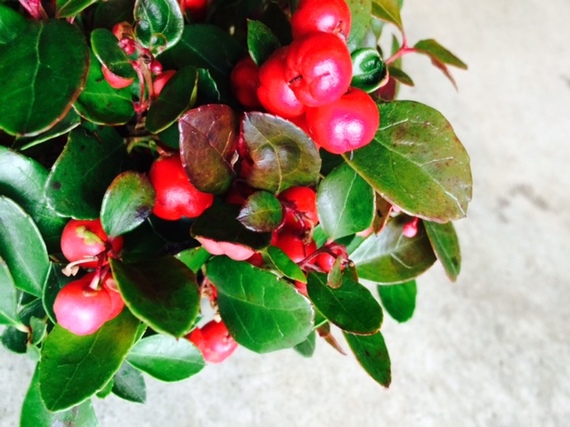Winterberry (Gaultheria procumbens) has always been a favorite of gardeners who are dealing with acidic soils. What's not to like? As long as it is given enough water, winterberry is a tough little groundcover that provides all-year interest. Winterberry's fondness for part shade makes it perfect for planting under larger azaleas and rhododendrons. Small, pinkish, hanging, urn-shaped flowers that delight during the summer turn into striking red berries in late autumn and early winter. I have seen this plant used as a blanket groundcover, but I think it is best used when given ample spacing, as one would in a rock garden. This plant has been on my radar for years, but my fondness for winterberry has been reinvigorated over the last couple of years as a new use for it has been brought to my attention: Winterberry is now being used as a temporary seasonal houseplant.
The red berries I spoke of almost seem like they were designed to be holiday decor. This is why floral and garden centers have turned to winterberry as an alternative to the ubiquitous poinsettia. Unlike poinsettias, winterberry is short in stature and can be used as a centerpiece on your dining room table without blocking diner's view of one another. The berries are edible and the leaves can be fermented and used for tea, but before you indulge, make sure that your winterberry plant was not sprayed with chemicals.
You might be wondering if winterberry can be kept inside all winter and then transplanted into your garden in the spring? I'm not sure -- I haven't tried it. My instincts tell me that winterberry would suffer from mealy bug if left in dry heat for too long. If you live somewhere that doesn't get a long deep freeze, you can transplant winterberry at anytime. For those of us in the northern states, a cooler place with natural light, such as a garage with a window, would be more ideal. That said, I would be more than pleased and pleasantly surprised if someone writes back to tell me their winterberry thrived in their living room all winter long.
